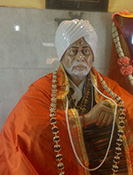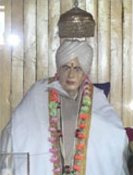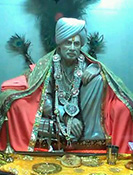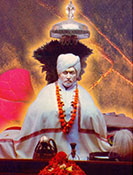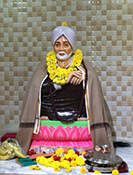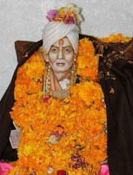Blessings of Bhagavaan ji
We all desire that we get Bhagavaan ji’s blessings but desiring is not enough; we have to deserve these. The question is how do we deserve his blessings and the answer is simple, by treading on the path shown by him and following the principles prescribed by him. Let us discuss these principles in order to understand what our duties and responsibilities are in order to be the proud recipients of his blessings, ‘Anugraha’.
‘Charitra’: The first and foremost lesson given by our Bab ji is that we should have good moral character. Cleanliness of body, mind and intellect are preconditions of having a good moral character. Purity is one of the three main traits emphasized by him for all of us to be adopted in our day to day life. When we are cautious to ensure that we are not only bodily clean and pure but also make sure that no bad idea is there in our mind and no bad thought erupts in our intellect, will our character be unblemished. In one of the Vedic prayers we say, ‘Tan me manah shiva sankalpam-astu – May my mind be full of noble resolves.’ It follows that when our mind and intellect are pure our deeds will definitely be noble and we shall have a high moral character. During his life time, we have been told, if any one of immoral character ventured to come near him or enter the room, he would chase him away often wielding the tong in his hand. He was so very particular that all of us should bear a good character that would endear us to him.
‘Guna’: The next lesson that he has given to us is that we should have virtues. He has placed three virtues on the top of the list and these are truth, straightforward attitude and purity. Truth is universally accepted as a trait of a good and noble person. Truth gives us boldness, courage and fearlessness. Simplicity and straight forward attitude endear us to everyone that we come across and purity gives us character. In olden days a student, after successfully completing his course of education, was given the first lesson at the ‘Dikshanta’ or convocation as ‘Satyam vada – always speak the truth.’ The second lesson, ‘Dharmam chara – do your duty’ would only follow. Such was the importance given to the virtue of truth. In fact if one goes by the Srimad Bhagavad Gita, twenty-six different virtues have been prescribed in Chapters XIII and XVI as ‘Daivi sampada’ or divine qualities. These include truth, fearlessness, altruism, non-violence, straightforwardness, simplicity, purity et al. Bhagavaan ji, in his wisdom, has picked up only three of these virtues and enjoined upon us to imbibe them. Actually if we imbibe these three qualities the remaining virtues will naturally follow.
‘Seva’: Service unto mankind is yet another trait that will endear us to our Bab Bhagavaan. Selfish living is an animal life. If we have to justify our position as the supreme creation of God Almighty, we have to live for others. Relieving people of their grief, helping them in their need, distributing love and compassion are the traits that help us elevate ourselves both in the worldly manner as also spiritually. Our ancestors used to say that one can serve others in three ways, by speech in the form of good advice, by money in the form of financial help and physically by rendering support and co-operation. We have created organizations in the name of our beloved Bhagavaan ji. These are right forums where we can enlist our support and through their programmes we can serve the needy.
‘Sadhana’: we must always remember that this body alone is not what constitutes our selves. There is something beyond this bodily structure that is the vital part of our existence. This is the real self and we have to endeavour to realize it, know its essence and then rise to a level where we will get merged with the universal entity called Brahman. This is the real Sadhana and there are various paths of this spiritual exercise. We can take any path suitable to our acumen and in tune with our capacity and inclination. The path can be of knowledge, Jnana, of action and deeds, Karma, of devotion and surrender, Bhakti or it can be Dhyana or contemplation. But all these paths lead to the same goal. It has been said in Shiva Mahimnastotra by Pushpadanta in very clear terms, ‘Riju kutila nana pathajusham nrinam eko gamyah twam asi payasam arnava iva – For different people taking different routes direct or indirect, you (Shiva) alone are the destination like the ocean is for different rivers.’ So the route can be any one but sadhana is important.
To sum up, once we have good moral character, qualities of virtue, a sense of service with compassion and we tread on the path of spirituality, the blessings or Anugraha of Bab ji Maharaj will automatically be showered on us. In fact we have not to ask for it. He is omnipresent and once he makes sure that we are deserving devotees he will shower his grace without our asking. He has made it clear that when the effort of a person and the divine blessings combine success follows naturally. These two together give us mundane happiness and spiritual bliss both. More often than not we ask for worldly facilities. There is nothing wrong in asking for these things but these are to be utilized for good and noble cause and not wasted away in transient pleasure seeking. There is a Sanskrit shloka, which says it all. ‘Vidya vivadaya dhanam madaya shakti pareshan paripeedanaya. Khalasya sadhor vipareetam-etat jnanaya, danaya cha rakhshanaya – A bad person utilizes his education in argument, his wealth for pride and arrogance and his strength in troubling others. A good person does opposite of it. He utilizes his education for knowledge, wealth for giving alms and helping others and his strength in protecting the week.’ So it is for us to decide how we should utilize whatever we get and achieve with the blessings of our Bhagavaan ji.
Let us deserve what we desire. Let us strive to achieve good qualities, high moral character and compassionate mind set. Bab ji is there to shower his grace ‘Anugraha’ on us so that we can proudly proclaim that we belong to the extended family of Bhagavaan ji, the saint of all times, our guide and saviour.
T.N.Dhar ‘Kundan’






